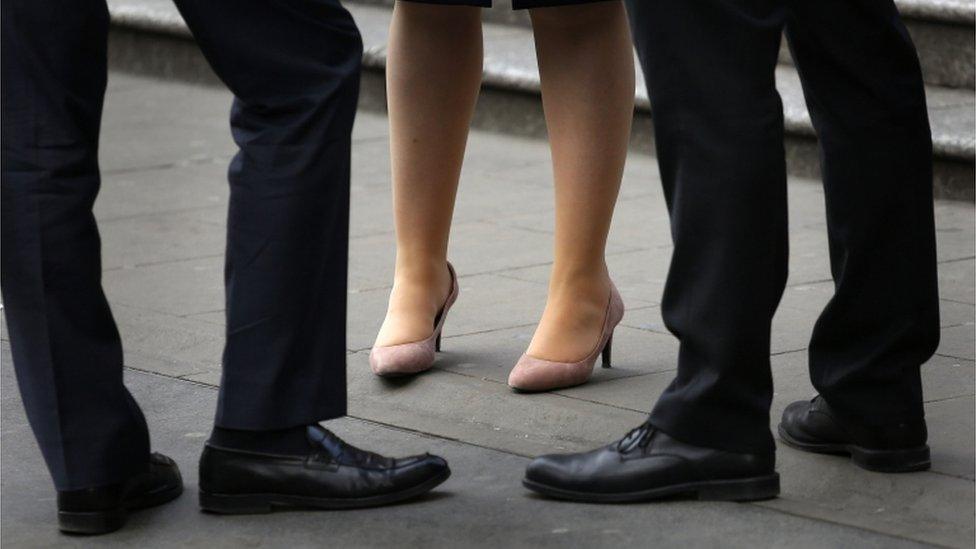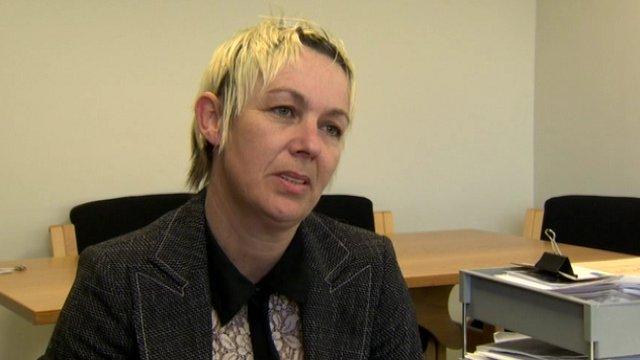Half of women 'sexually harassed at work' - TUC survey
- Published

Most women won't tell their employer that they have been harassed
More than half of women say they have been sexually harassed at work and most admit to not reporting it, new research by the TUC, external suggests.
A survey of 1,500 women saw 52% cite the problem and also found a third had been subjected to unwelcome jokes and a quarter experienced unwanted touching.
TUC head Frances O'Grady said it left women feeling ashamed and frightened.
She told BBC Radio 4's Today: "It makes us miserable at work where we just want to do our job and be respected."
She also called it a "scandal" that so few women felt their bosses were dealing with the issue properly.
Sexual harassment at work can take many forms, from inappropriate comments and jokes about a colleague's sex life to unwanted touching, hugging or kissing and even demands for sexual favours, the TUC said.
The Citizens Advice Bureau says sex discrimination can occur, external when people are applying for promotion or flexible working and when decisions are made about who is chosen for redundancy, or training and development opportunities.

'The company did nothing'
BBC News website reader Imogen said: "For three years whilst at university I worked as a lifeguard. A male colleague only a year or two older than me would constantly grope me on the poolside in front of swimmers and other members of staff.
"I would constantly tell him it made me uncomfortable but he just continued and would joke that I 'loved it'.
"One evening, he followed me into the stockroom, with the door shut and the lights turned off. He immediately began aggressively groping my bum and grabbing my breasts and repeatedly asking me why was I snitching on him and why was I spreading lies about him.
"In tears I ran to my line manager to tell him what had just happened. The company did nothing."

The TUC found that in nine out of 10 cases the perpetrator was male and nearly one in five women (17%) said it was their line manager, or someone with direct authority over them.
Some 79% of women who said they were victims of sexual harassment did not tell their employer.
Reasons given included fear that reporting would affect their relationships at work (28%) or their career prospects (15%).
Nearly a quarter (24%) of those who did not report abuse said it was because they felt that they would not be believed or taken seriously and 20% said they were too embarrassed.

Sexual harassment is a form of discrimination under the Equality Act of 2010
The proportion of women facing harassment is higher among the youngest workers - nearly two-thirds (63%) of the 138 women aged between 18 and 24 surveyed said they had been sexually harassed at work.
Young women were often on casual contracts, such as temporary agency or zero-hours contracts. They were also likely to be in more junior roles, all of which may be factors in sexual harassment, said the TUC.
The survey also found:
More than one in four (28%) respondents were the subject of comments of a sexual nature about their body or clothes at work
A fifth (20%) suffered unwanted verbal sexual advances at work
And around one in eight (12%) experienced unwanted sexual touching or attempts to kiss them at work
The government needs to "send a clear signal that this behaviour is unlawful" says the TUC's Frances O'Grady
Ms O'Grady added: "They have to ask why it is we are not stamping this kind of behaviour out. We have been calling for tougher action from employers and we want the government to send a clear signal that this kind of behaviour is unlawful.
"I think the most worrying fact from these findings is the number of women who simply don't feel able to report it. "
One young woman told the TUC anonymously that in her previous job she worked in an almost exclusively male salesroom.
"Sexual comments about me or others, either to me or overheard in my presence, were a fact of daily working life. Some of those comments were violent in nature," she said.

Your rights
The Citizens Advice Bureau urges people to act as quickly as possible if they fall victim to sex discrimination or sexual harassment at work, suggesting:
Tell the person to stop, if you feel it is safe to do so
Tell your manager what is happening. Put it in writing and keep a copy
Talk to your personnel department or trade union
Get advice
Collect evidence by keeping a diary of any incidents, including time, date and location, what was said or done, who was involved and any witnesses
If informal procedures are unsuccessful, raise a grievance with a formal written complaint to your employer

'Alive and well'
Laura Bates, founder of the Everyday Sexism Project, external which helped with the report, said many people would like to think that workplace sexual harassment was a thing of the past.
"In reality it is alive and well, and having a huge impact on tens of thousands of women's lives."
Men have also been victims of sexual harassment at work, with one, Simon, telling BBC News: "I frequently get touched on the upper arm, called 'darling' or 'sweetheart'.
"I do not like it, I do not invite it and am unsure how to respond. I am male and the perpetrators are female. I would feel a wuss if I were to complain. This does not just happen to females."
- Published10 August 2016

- Published19 April 2013

- Published21 October 2015

- Published7 June 2016
